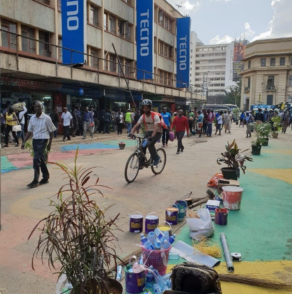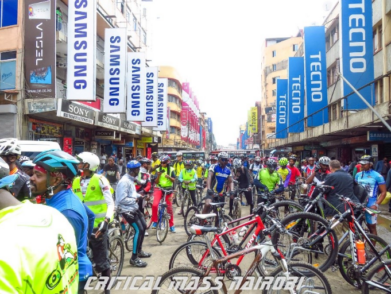EPIC-Africa Brings Student Voices to Walkability Project in Nairobi
Metrics
Community
NairobiCommunity Size
4.397 MillionUniversity
University of Nairobi & Technical University of KenyaProgram
ProgramYears
2018-2019Status
CompletedCase Type
Project StoriesFocus Areas
Infrastructure, Road DesignDiscipline
Law, Urban DesignSustainable Development Goals
09 Industry Innovation and Infrastructure, 11 Sustainable Cities and Communities
From 2018 to 2019, law students from the University of Nairobi, urban design students from the Technical University of Kenya, and city council members worked with project lead Edna Odhiambo to address walkability concerns in the central business district (CBD) of Nairobi. The goal was to sustainably improve infrastructure and road design, reduce hazards, and improve air quality so that pedestrians and cyclists could better enjoy the local markets and stimulate the economy. Over the course of this project, students helped gather essential data, curate city council reports, and generate pedestrian-friendly street designs. In an effort to showcase the different functions of the CBD and demonstrate the impact of making the area 100% walkable, part of this project involved closing the main street to vehicles for a brief period of time. Although skeptical at first, shop owners were pleasantly surprised to find that increased walkability positively impacted their business prospects, and pedestrians greatly enjoyed the added safety and relaxed atmosphere. This project gained substantial local and international support before and after its conception, drawing in partners such as the Nairobi governor, United Nations Environment Program, United Nations Habitat, and the Stockholm Environment Institute who provided funding to continue upscaling efforts. Students taking courses on land use and climate change at the university were able to use this project opportunity to give regulatory recommendations, as well as help collect additional data after the city council had made pavement improvements in the CBD. Providing real life applications to course work through this project has allowed students to be civically engaged and contribute their knowledge to community improvement, as well as gain valuable experiences that they can utilize in future careers.

As EPIC-N strives to create meaningful partnerships and engagement opportunities for students, project managers in Nairobi hope that there will be future opportunities for youth involvement and the possibility of students leading work on other city issues. Thanks to the precedent of this project, Nairobi’s city walkability and bikeability developments have continued to grow and evolve, now utilizing the resources and expertise of various partners around the globe to achieve safer, more vibrant streets and paths.

